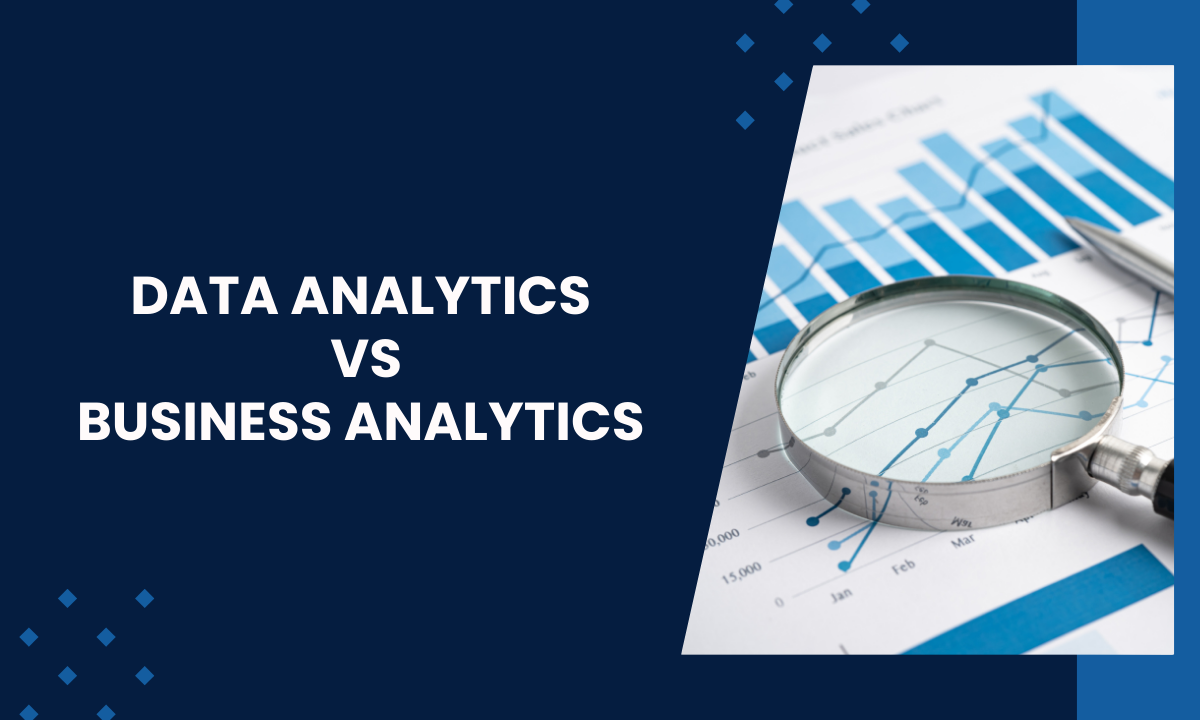- Delhi
- Last Update 06:20: am

Understanding the Key Differences Between Data Analytics and Business Analytics
In today's data-driven world, terms like "Data Analytics" and "Business Analytics" are frequently thrown around, but what do they really mean? Are they just buzzwords, or do they hold significant differences? Let's dive in and unravel the mysteries behind these two concepts.
Data Analyst Vs Business Analyst: Key Differences
1. Focus and Objectives:
Data Analyst:
- Focuses on analyzing data to uncover trends, patterns, and insights.
- Primarily deals with structured data and works on descriptive and diagnostic analysis.
- Aims to answer specific questions and solve immediate problems based on data analysis.
Business Analyst:
- Concentrates on understanding business processes, identifying opportunities, and optimizing business performance.
- Works with both structured and unstructured data, employing descriptive, predictive, and prescriptive analytics.
- Seeks to translate data insights into actionable recommendations to support strategic decision-making.
2. Skill Set and Expertise:
Data Analyst:
- Proficient in data manipulation, cleaning, and visualization techniques.
- Skilled in statistical analysis and data mining to extract meaningful insights.
- Familiar with tools such as SQL, Python, R, and visualization libraries like Matplotlib and Tableau.
Business Analyst:
- Possesses strong business acumen and understanding of industry dynamics.
- Capable of translating business requirements into data-driven solutions.
- Skilled in process modeling, requirement gathering, and stakeholder management.
3. Scope of Work:
Data Analyst:
- Works closely with data engineers and scientists to ensure data quality and accuracy.
- Focuses on analyzing historical data to understand past trends and performance.
- Outputs include reports, dashboards, and data visualizations to communicate findings effectively.
Business Analyst:
- Collaborates with various stakeholders across departments to gather requirements and understand business needs.
- Analyzes both internal and external data to identify business opportunities and threats.
- Generates business cases, ROI analysis, and recommendations to drive strategic initiatives.
4. Decision Making:
Data Analyst:
- Provides insights and recommendations based on data analysis.
- Supports tactical decision-making by identifying areas for improvement or optimization.
Business Analyst:
- Guides strategic decision-making by providing actionable insights and recommendations aligned with organizational goals.
- Plays a crucial role in defining business strategies and initiatives based on data-driven insights.
Similarities Between Data Analysts and Business Analysts
While Data Analysts and Business Analysts have distinct roles and responsibilities, there are several similarities between the two positions:
1. Working with Data: Both Data Analysts and Business Analysts deal with data as the core aspect of their roles. They collect, clean, manipulate, and analyze data to derive insights and make informed decisions.
2. Analytical Skills: Both roles require strong analytical skills to interpret data effectively. Data Analysts and Business Analysts use statistical techniques, data mining, and visualization tools to extract meaningful patterns and trends from data sets.
3. Problem-Solving Abilities: Data Analysts and Business Analysts are adept at solving complex problems. They identify issues, formulate hypotheses, and conduct analyses to address business challenges and opportunities.
4. Communication Skills: Effective communication is crucial for both roles. Data Analysts and Business Analysts must be able to convey their findings and recommendations to stakeholders in a clear and understandable manner, whether through reports, presentations, or visualizations.
5. Understanding Business Context: While Data Analysts primarily focus on data analysis, they also need to understand the broader business context in which their analyses are applied. Similarly, Business Analysts require a deep understanding of data and analytics to translate business requirements into actionable insights.
By recognizing these similarities, organizations can leverage the complementary skills and expertise of Data Analysts and Business Analysts to maximize the value derived from data and analytics initiatives.
Salary Comparison: Data Analysts Vs Business Analysts
business analysts tend to earn a slightly higher average salary compared to data analysts. Here's a quick breakdown:
Business Analyst: The average base salary for a Business Analyst in India is around ?8,50,000 per year. This can range anywhere from ?3,00,000 for beginners to ?15,80,000 for highly experienced professionals.
Data Analyst: The average base salary for a Data Analyst in India is around ?7,00,000 per year. This can range anywhere from ?2,00,000 for beginners to ?12,00,000 for highly experienced professionals.
Overview of Data Analytics Vs Business Analytics
Business analytics: Business analytics involves the use of statistical analysis, predictive modeling, and data mining techniques to extract insights from large datasets and drive informed decision-making. It includes a variety of approaches and instruments designed to find patterns, trends, and connections in data to assist companies in streamlining operations, enhancing output, and gaining a competitive advantage in the marketplace.
Data Analytics: Data analytics refers to the process of examining large sets of data to uncover patterns, trends, correlations, and other insights. In order to extract useful information for problem-solving, decision-making, and process optimization, it entails gathering, cleaning, processing, and analyzing data. In order to make sense of data and obtain actionable insights that can inform corporate strategies, better operations, improve goods and services, and accomplish organizational objectives, data analytics employs a variety of methodologies, algorithms, and tools.
How to Start a Career in Both Roles?
Starting a career as a Data Analyst or Business Analyst requires a combination of education, skills, and experience. Here's a comprehensive guide on how to kick-start your journey in both roles:
1. Education and Qualifications:
Bachelor's Degree: While not always mandatory, a bachelor's degree in fields such as mathematics, statistics, computer science, economics, or business administration can provide a solid foundation for a career in either role.
Specialized Courses: Consider pursuing specialized courses or certifications in data analysis, business analytics, statistics, or related fields to enhance your knowledge and skills. Online platforms like Coursera, Udemy, and edX offer a wide range of courses tailored to both roles.
2. Develop Technical Skills:
Data Analysis Tools: Familiarize yourself with popular data analysis tools and software such as Microsoft Excel, SQL, Python, R, and data visualization tools like Tableau or Power BI.
Business Intelligence Tools: Gain proficiency in business intelligence tools like Microsoft Power BI, IBM Cognos, or SAP BusinessObjects to analyze and present data effectively.
3. Gain Hands-On Experience:
Internships: Seek internships or entry-level positions in data analysis or business analysis to gain practical experience and exposure to real-world projects and datasets.
Freelance Projects: Consider taking on freelance projects or participating in online competitions like Kaggle to hone your skills and build a portfolio of projects.
4. Develop Soft Skills:
Communication: Develop strong communication and interpersonal skills to effectively convey complex data insights to stakeholders and collaborate with cross-functional teams.
Problem-Solving: Cultivate problem-solving skills to analyze data, identify patterns, and derive actionable insights to address business challenges and opportunities.
5. Networking and Professional Development:
Join Professional Associations: Join industry-specific associations and networking groups such as the International Institute of Business Analysis (IIBA) or the Data Science Association to connect with professionals in the field and stay updated on industry trends.
Attend Workshops and Conferences: Attend workshops, seminars, and conferences related to data analysis, business analytics, and related fields to expand your knowledge, network with industry experts, and explore job opportunities.
6. Build a Strong Online Presence:
LinkedIn Profile: Create a professional LinkedIn profile highlighting your skills, education, and relevant experience. Connect with professionals in the field and join relevant groups and communities to expand your network.
Personal Projects: Showcase your skills and expertise by creating a personal website or blog where you can share insights, analyses, and projects related to data analysis or business analytics.
7. Continuously Learn and Adapt:
Stay Updated: Keep abreast of the latest trends, technologies, and best practices in data analysis and business analytics through continuous learning and professional development.
Seek Feedback: Solicit feedback from peers, mentors, and industry professionals to identify areas for improvement and refine your skills and approach.
Final Thoughts
In today's data-driven world, terms like "Data Analytics" and "Business Analytics" are often used interchangeably, but they hold significant differences. Data Analysts focus on analyzing data to uncover trends and patterns primarily from structured data, while Business Analysts concentrate on understanding business processes and translating data insights into actionable recommendations. Both roles require similar skills such as analytical prowess, problem-solving abilities, and effective communication. By recognizing these distinctions and similarities, individuals can embark on a career path in either role by acquiring the necessary education, technical skills, hands-on experience, and continuous professional development.









